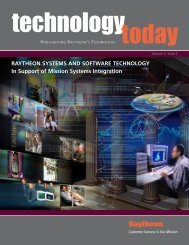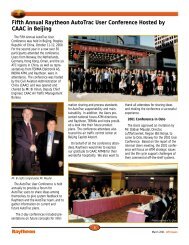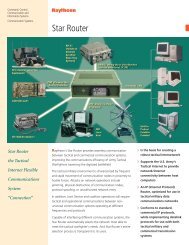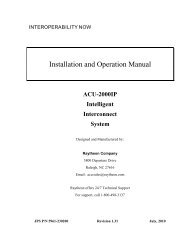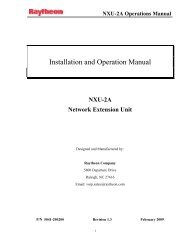Raytheon Company Public Key Infrastructure (PKI) Certificate Policy
Raytheon Company Public Key Infrastructure (PKI) Certificate Policy
Raytheon Company Public Key Infrastructure (PKI) Certificate Policy
Create successful ePaper yourself
Turn your PDF publications into a flip-book with our unique Google optimized e-Paper software.
5.6 <strong>Key</strong> Changeover<br />
A CA uses a signing (private) key for creating certificates; however, relying parties employ the<br />
CA certificate for the life of the Subscriber certificate beyond that signing. Therefore, CAs must<br />
not issue Subscriber certificates that extend beyond the expiration dates of their own certificates<br />
and public keys, and the CA certificate validity period must extend one Subscriber certificate<br />
validity period (listed in Section 3.3) past the last use of the CA private key.<br />
To minimize risk to the <strong>PKI</strong> through compromise of a CAs key, the private signing key shall be<br />
changed more frequently, and only the new key shall be used for certificate signing purposes<br />
from that time. The older, but still valid, certificate shall be available to verify old signatures until<br />
all of the Subscriber certificates signed under it have also expired. If the old private key is used<br />
to sign CRLs that contain certificates signed with that key, then the old key must be retained<br />
and protected. For a thorough discussion of key changeover, see <strong>Certificate</strong> Management<br />
Protocol [RFC2510].<br />
The following table provides the life times for certificates and associated private keys.<br />
<strong>Key</strong> 1024 Bits 2048 Bit <strong>Key</strong>s<br />
Private <strong>Key</strong> <strong>Certificate</strong> Private <strong>Key</strong> <strong>Certificate</strong><br />
Root CA 5 years 5 years 15 years 20 years<br />
Signing CA 5 years 5 years 6 years 8 years<br />
Subscriber Identity or 3 years 3 years 3 years 3 years<br />
Signature<br />
Subscriber Encryption 3 years 3 years 3 years 3 years<br />
Code Signer 3 years 3 years 5 years 5 years<br />
Device 3 years 3 years 3 years 3 years<br />
For additional constraints on certificate life and key sizes, see Section 6.1.5.<br />
5.7 Compromise and Disaster Recovery<br />
5.7.1 Incident and Compromise Handling Procedures<br />
If a CA or CSA detects a potential hacking attempt or other form of compromise, it shall perform<br />
an investigation in order to determine the nature and the degree of damage. If the CA or CSA<br />
key is suspected of compromise, the procedures outlined in Section 5.7.3 shall be followed.<br />
Otherwise, the scope of potential damage shall be assessed in order to determine if the CA or<br />
CSA needs to be rebuilt, only some certificates need to be revoked, and/or the CA or CSA key<br />
needs to be declared compromised.<br />
The RPMA members shall be notified if any of the following cases occur:<br />
� Suspected or detected compromise of the <strong>Raytheon</strong> <strong>PKI</strong> system;<br />
� Physical or electronic attempts to penetrate the <strong>Raytheon</strong> <strong>PKI</strong> system;<br />
� Denial of service attacks on a <strong>Raytheon</strong> <strong>PKI</strong> component; or<br />
� Any incident preventing the <strong>Raytheon</strong> <strong>PKI</strong> from issuing a CRL within 24 hours of the time<br />
specified in the next update field of its currently valid CRL.<br />
The RPMA, CPMA and all cross certified <strong>PKI</strong>s shall be notified if any of the following cases<br />
occur:<br />
� A CA certificate revocation is planned; or<br />
55 7/25/2011





